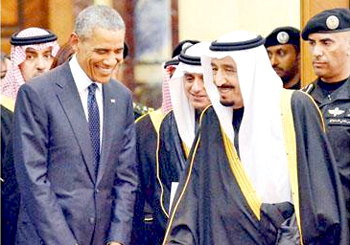
Riyadh, Jan 28: Custodian of the Two Holy Mosques King Salman and US President Barack Obama pledged to work closely on a range of regional and international issues at a meeting on Tuesday, including terrorism, the Iranian nuclear talks and conflicts in neighboring states.
In their first formal meeting, the talks focused broadly on counter-terrorism and regional stability with special reference to bilateral Saudi-US relations. Obama’s meeting with King Salman comes just days after the death of King Abdullah, who was buried on Friday.
The White House said the main reason for Obama’s trip was to pay his respects to the country that has been a key ally in the region. Obama had arrived with his wife Michelle, accompanied by a delegation of about 30 members. During his four-hour stop in Riyadh, Obama also attended a dinner with Saudi officials at Erga Palace.
A member of the delegation said the trip was an opportunity to “pay respects to the legacy of King Abdullah, who was a close partner of the US, and also discuss some of the issues where we are working together, which include Islamic State, Yemen, the Iranian nuclear negotiations and the broader US-Saudi relationship.”
According to a Royal Court statement, the meeting was significant.
“During the visit, official talks were held between Custodian of the Two Holy Mosques King Salman and President Obama on regional and international issues of common interest in addition to setting out the means to enhance bilateral relations.”
Earlier, Johann Schmonsees, press attache at the US embassy here, said: “We adjusted the president’s schedule in coordination with the Indian government so that he would be able to depart India on Tuesday, to stop in Riyadh during the return trip and meet with King Salman and other Saudi officials, and offer his condolences on behalf of the American people.”
The US delegation was met at the airport by King Salman with a full guard of honor and the playing of the national anthems of the two countries.
King Salman also introduced his senior ministers to Obama, including Crown Prince Muqrin; Deputy Crown Prince Mohammed bin Naif, who is also Second Deputy Premier and Interior Minister; and Prince Khaled bin Bandar, chief of general intelligence.
Riyadh Gov. Prince Turki bin Abdullah, Saudi ambassador to the US Adel Al-Jubeir and his counterpart in Riyadh Joseph Westphal were also present at the airport.
According to the US embassy Riyadh, Obama led a delegation of current and former US officials, which include John Kerry, secretary of state; John McCain, senator from the state of Arizona; and Mark Warner, senator from the Commonwealth of Virginia.
The others included Valerie Jarrett, senior adviser and assistant to the president for intergovernmental affairs and public engagement; Susan Rice, assistant to the president and national security adviser; Jennifer Palmieri, assistant to the president and director of communications; Lisa Monaco, assistant to the president for homeland security and counter terrorism; and Peter A. Selfridge, United States Chief of Protocol.
The other members included John Brennan, director of the Central Intelligence Agency; General Lloyd J. Austin III, commander of US Central Command; James Baker, former secretary of state; Condoleezza Rice, former secretary of state; Brent Scowcroft, former national security adviser; and several other foreign policy leaders from past administrations. Vice President Joe Biden had remained in Washington.
Baker is revered in the Arab Gulf region, particularly Saudi Arabia and Kuwait, for his role in orchestrating the alliance against Saddam Hussein in 1990 and 1991.





Comments
Add new comment